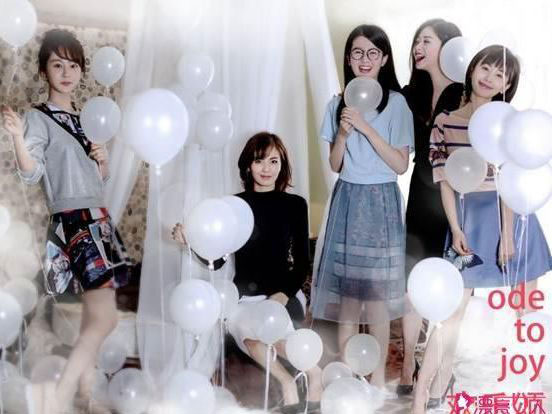A new drama recently generated heated discussions among Chinese online audiences. But not just on the appearance of characters this time.
The new drama is called Ode to Joy, or Huanlesong in Chinese, with some people comparing it to “Sex and the City” minus sex.

Poster of Ode to Joy. Yang Zi (left), Liu Tao, Qiao Xin, Jiang Xin, and Wang Ziwen (right). Photo: k618.cn
Compared with the last hit TV drama Descendants of the Sun, a Korean series based on a love story between a doctor and soldier, in which Chinese audiences, mostly female, were much more obsessed with the face and manner of the hero acted by Song Joong-ki than the plot itself, the 42-episode Ode to Joy not only got a high audience rating because of its realistic story, but also triggered a nationwide discussion on social reality, in particular of the Chinese millennials who are trying to figure out their social identity and next moves in lives.
On Sina Weibo, China’s largest social media, more than 3 million users are discussing the drama under the hashtag Huanlesong.
Featuring Liu Tao, Jiang Xin, Wang Ziwen, Yang Zi and Qiao Xin, five Chinese actresses, the drama tells a story of five women from different social classes living and working in Shanghai trying to get ahead in life.
While Andi (portrayed by Liu Tao), a former Wall Street senior executive, is a CFO in a company in Shanghai, and Qu Xiaoxiao (portrayed by Wang Ziwen), a second rich generation (fu’erdai in Chinese), runs her own company with the help of her father, the other three, Fan Shengmei (portrayed by Jiang Xin), Guan Ju’er (portrayed by Qiao Xin) and Qiu Yingying (portrayed by Yang Zi) share one apartment like most Chinese young people aged 20-30 living and working in metropolitan cities such as Shanghai, Beijing, and Guangzhou.
Debuting on April 18, the drama was clicked for more than 900 million times in the first two weeks on Aiqiyi, one of the five streaming websites where it is available, according to china.com.cn.
In the first part of the drama, some of the characters struck a chord with the audiences as they reflected the reality of the viewer’s own lives. “I’m not one of the five characters, but I can see my shadow in them”, said @sijun2316 .
The drama reaches a peak with the story of Fan who was first considered as vainglorious and obsessed with money turned out to be trapped by her family. Aged 30, Fan is a typical “leftover woman” in China. Despite a senior HR job in a big company in Shanghai with a salary of around 10,000 yuan ($1,530) per month, Fan has to send more than a half of her salary each month to her family, which favors her elder brother to her, leaving little for her own life. For Fan, the only way to break the shackle of her family is to marry a rich man, until she finds out that she was cheated by a second rich generation man when her father’s life was at stake. Luckily, Fan’s stubborn and conventional parents finally begin to rethink their role as parents and let Fan have her own life as long as Fan sends money to them every month.
“It seems that no matter how hard you try, everything is pre-determined,” many users commented on Weibo.
Meanwhile, with the life path of the five characters remaining unchanged when the drama concluded on May 10, many netizens attributed such an ending to a declining social mobility and worry that China’s “ladders of opportunity” are failing.
“Rich people are becoming richer, while poor people are becoming poorer. And only people in the same social class can get together. It seems that this is what the writer is trying to tell us in the end,” one said.
| Touched | Sympathetic | Bored | Angry | Amused | Sad | Happy | No comment |